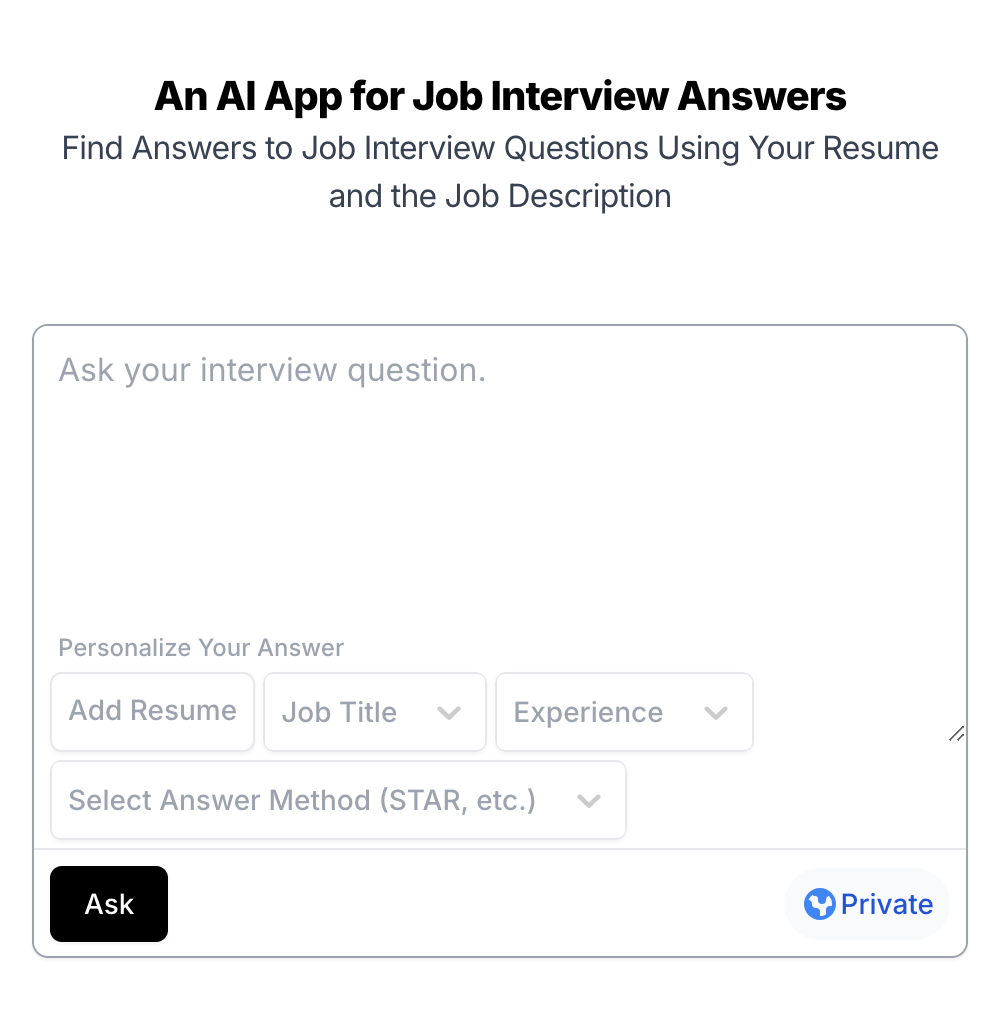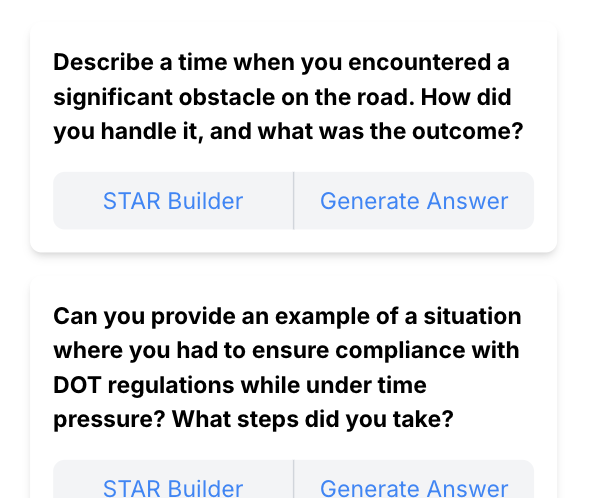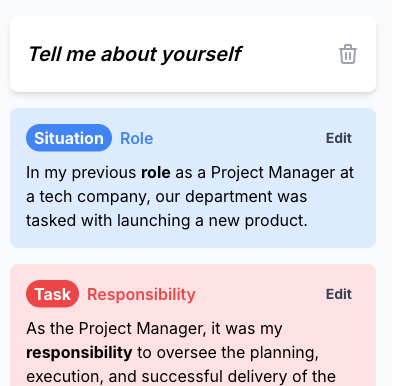
Problem-Solving Interview Questions: What You Need to Know
Sat Aug 24 2024•Author: InterviewPro AI
Table of Contents
- What Are They?
- Common Examples
- Answer Length
- What to Avoid Saying
- Possible Follow-Ups
- More Follow-Up Questions
- When They're Asked
- Who Asks Them
- Why They Matter
- How to Answer Well
- Answer Structure
What Are They?
Problem-solving questions ask how you'd handle real work challenges. Employers use them to see how you analyze issues, find solutions, and make decisions. They want to know your approach to solving problems in the workplace.
5 Common Examples
- Tell me about a time you faced a difficult problem at work. How did you solve it?
- How do you approach a problem you've never encountered before?
- Describe a situation where you had to think outside the box to solve a problem.
- How do you handle a situation where you don't have all the information you need?
- Can you give an example of a time you turned a problem into an opportunity?
Answer Length
Aim to keep your answer to about 2-3 minutes. This gives you enough time to describe the problem, your approach, and the outcome without going into too much detail. Your answer shows your problem-solving skills, so be clear and concise.
What to Avoid Saying
Don't say these things when answering problem-solving questions:
-
Don't give vague answers Bad example: "I just figured it out eventually." Why it's bad: This doesn't show your problem-solving process or skills.
-
Don't blame others Bad example: "The problem was caused by my coworker's mistake." Why it's bad: This shows a lack of accountability and teamwork.
-
Don't exaggerate your role Bad example: "I single-handedly saved the company millions." Why it's bad: This might seem unbelievable and show a lack of humility.
-
Don't focus only on the problem Bad example: "It was a really tough situation and caused a lot of stress." Why it's bad: This doesn't highlight your problem-solving abilities.
-
Don't give answers without results Bad example: "I tried a few things but I'm not sure what happened after that." Why it's bad: This suggests you don't follow through or learn from outcomes.
-
Don't say you've never faced problems Bad example: "I've never really encountered any significant problems at work." Why it's bad: This seems unrealistic and shows a lack of self-awareness.
-
Don't give answers that show poor judgment Bad example: "I decided to ignore company policy to solve the problem quickly." Why it's bad: This shows you might make risky or unethical decisions.
Show that you can analyze problems, come up with effective solutions, and learn from the outcomes.
Possible Follow-Ups
After you answer, the interviewer might ask more about your problem-solving process. They could ask about:
-
Your analysis: They might want to know how you identified the root cause. Example: "How did you determine the main cause of the problem?"
-
Alternative solutions: They could ask what other options you considered. Example: "What other solutions did you think about before choosing this one?"
-
Obstacles: They might ask what challenges you faced while solving the problem. Example: "What difficulties did you encounter while implementing your solution?"
-
Teamwork: They could ask how you involved others in the problem-solving process. Example: "Who else did you work with to solve this problem, and how?"
-
Lessons learned: They might ask what you'd do differently next time. Example: "Looking back, is there anything you would change about your approach?"
-
Long-term impact: They could ask how your solution affected things in the long run. Example: "How did your solution impact the team or company over time?"
5 More Follow-Up Questions
- "How did you prioritize the steps in your problem-solving process?"
- "What resources or tools did you use to help solve the problem?"
- "How did you communicate your solution to stakeholders?"
- "What was the most challenging part of solving this problem?"
- "How did you measure the success of your solution?"
When They're Asked
You might hear these questions at different stages of the interview process:
-
Initial Screening: You might get basic problem-solving questions to assess your general approach. Example: "How do you typically approach a new problem?"
-
First Interview: This is when you'll likely face most problem-solving questions, often mixed with behavioral questions. Example: "Can you describe a time when you had to solve a complex problem under tight deadlines?"
-
Technical Interviews: For technical roles, you might get specific problem-solving scenarios related to your field. Example: "How would you debug this piece of code?"
-
Panel Interviews: Different interviewers might ask about various aspects of your problem-solving skills. Example: "How do you handle problems that involve multiple departments?"
-
Final Rounds: You might face more strategic problem-solving questions here. Example: "How would you approach improving our company's customer satisfaction scores?"
These questions can come up at any time, depending on the role and the company's interview process.
Who Asks Them
-
HR Professionals: Example: "How do you handle conflicts within a team?"
-
Hiring Managers: Example: "Tell me about a time you solved a problem that improved efficiency in your department."
-
Department Heads: Example: "How would you approach reducing costs in our operations?"
-
Potential Colleagues: Example: "Can you describe how you've solved a technical problem in your previous role?"
-
C-Level Executives: Example: "How would you solve our company's biggest challenge right now?"
-
External Recruiters: Example: "What's your approach to solving problems in a new work environment?"
The person asking usually chooses questions that relate to the specific role or company challenges.
Why They Matter
These questions reveal your analytical skills, creativity, and ability to handle workplace challenges. They give employers insight into how you approach difficulties and find solutions. Employers use these questions to predict how well you might handle real problems in the role.
How to Answer Well
- Use specific examples from your experience
- Clearly explain your problem-solving process
- Highlight your analytical and critical thinking skills
- Show how you collaborate with others to solve problems
- Emphasize the positive outcomes of your solutions
Answer Structure
Use this framework to structure your answer:
- Describe the situation: Briefly explain the problem you faced
- Explain your analysis: Talk about how you identified the root cause
- Detail your solution: Describe the steps you took to solve the problem
- Share the outcome: Discuss the results and any lessons learned
Problem-solving questions let you showcase your analytical abilities and decision-making skills. Use them to demonstrate how you can add value to the company. Your answer helps employers assess your potential performance in the role, so focus on demonstrating a logical and effective approach to tackling challenges.
Can't find what you're looking for?
Try our AI-Powered Interview Preparation Tools
Prepare for your job interview with our AI tools. Tailored answers, custom questions, and STAR method responses.


